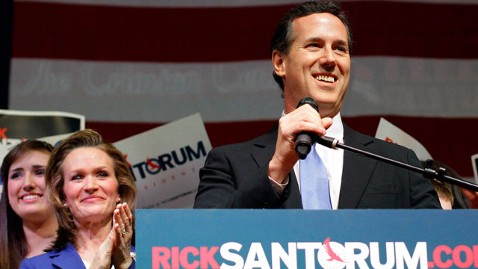Rick Santorum Will Face More Ballot, Delegate Problems

Eric Gay/AP Photo
Rick Santorum's ballot problems keep getting worse.
The candidate failed to appear on the ballot in Virginia on Super Tuesday, losing his chance to win 46 delegates. He also may have lost his chance at more than a quarter of the delegates in Ohio, after he failed to qualify full slates of delegates in a few congressional districts. (Ohio has not yet finalized its delegate allocation.)
In the coming month, Santorum will face similar problems in Washington, D.C. and Illinois.
Santorum will not be on the ballot in D.C.'s primary, a true winner-take-all contest on April 3, costing him a chance at the District's 16 allocated delegates (out of 19 total).
His failure to qualify in the nation's capital hints at organizational challenges.
Compared to Virginia, where Newt Gingrich also failed to meet relatively weighty requirements - and also failed to appear on the ballot - D.C.'s qualification standards are meager.
By Jan. 4, candidates had to either collect 296 signatures and pay $5,000 to the D.C. GOP, or forgo the signatures entirely and pay a higher fee of $10,000-a new option passed by the D.C. Council and signed by Mayor Vincent Gray in late December.
Santorum's campaign did not pay the fee, nor did it request a petition for signatures, according to a board official. In fact, the Santorum camp made no contact with the D.C. Board of Elections, the official said.
Mitt Romney, by contrast, sent his son Josh to drop off 700 signatures at the D.C. elections board, in person, three weeks before the deadline.
In Illinois, Santorum failed to file slates of delegates in a handful of congressional districts, similar to the shortcomings he faced in Ohio. The former senator will, however, appear on Illinois's statewide presidential-preference ballot in the March 20 primary.
The failure to file slates of delegates in some districts will cost Santorum the chance to win 10 delegates, out of the 54 allocated at Illinois's congressional-district level. Another 15 Illinois delegates will not be awarded to any candidate in advance; those delegates can support whomever they choose at the Republican National Convention in Tampa, Fla., this August.
In Illinois, candidates must collect 600 signatures in each congressional district to present full "slates," or lists of delegates, on the primary-day ballot in each district. In addition to voting on presidential candidates, Illinois voters elect their delegates. On the ballot, next to each delegate candidate's name, is the name of the presidential candidate they support. In four congressional districts, no delegates are supporting Santorum.
Santorum filed only 44 of the possible 54 delegates in Illinois, filing no candidates in the state's 4th, 5th, 7th, and 13th Congressional Districts.
The 13th District, which stretches from Central to Southern Illinois, could be good territory for Santorum, according to one Illinois political insider. The 4th, 5th, and 7th Districts fall in the Chicago area, which may not be natural Santorum territory. But downstate tends to vote more conservative, putting the 13th District more squarely in Santorum's wheelhouse, as he pitches himself as a more conservative alternative to the frontrunner Romney.
All of these troubles stand to undermine a central argument made by Santorum's relatively shoestring campaign: that the race is far from over. Delegates will decide the nominee, and if Santorum can't collect enough along the way, his plausibility as an eventual winner will diminish.